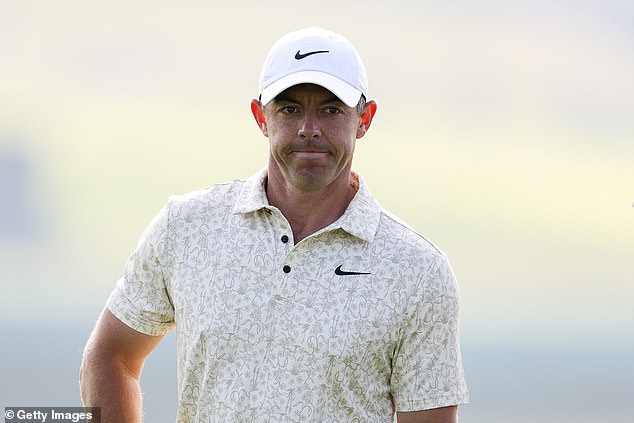Rory McIlroy’s Struggles at the US Open: Analyzing the Pressure
By Oliver Salt
Published: 18:15 EDT, 13 June 2025 | Updated: 15:04 EDT, 15 June 2025
As the spotlight of the golf world shines brightly on the US Open, Northern Irish golfer Rory McIlroy continues to find himself entangled in a web of frustration and challenges. After an impressive victory at the Masters in April, where McIlroy secured his career Grand Slam, his post-Masters performance has left fans and analysts alike concerned about his current form. Competing at Oakmont, McIlroy’s struggles became evident as he battled against the backdrop of rising tension and expectations.
A Rocky Start: McIlroy’s First Two Rounds
The US Open did not begin well for McIlroy, who finished the first round with a disappointing four-over-par 74. As he headed into the second round, he faced a pivotal moment where he hoped to claw back into contention. The pressure was palpable, and as the challenging conditions of Oakmont took their toll, his frustration soon became apparent. Misplays, including a troubling second shot on the daunting 12th hole, resulted in a moment of rage where he threw his club, dropping even further back in the standings.
The Mental Game: Pressure Takes Its Toll
Golf is as much a mental sport as it is physical. McIlroy’s drop to +8 put him dangerously close to missing the cut line, reinforcing the psychological weight he carries during high-stakes tournaments. While there are moments of brilliance — such as his birdie on the 14th — inconsistency has marred his performance. Another incident on the 17th hole, where he hit a poor drive and smashed a tee marker, illustrated the culmination of pressure weighing down on one of golf’s elite talents.
Historic Achievements: The Pressure of a Grand Slam
Achieving a career Grand Slam is a monumental feat in golf, yet it can also lead to unexpected pressures. Since that monumental win at the Masters, McIlroy’s performance has dipped, evident by a placement far behind current leaders like JJ Spaun and Sam Burns, both of whom have shown steadiness in their game. McIlroy’s earlier triumph appears overshadowed as doubts start to creep into discussions surrounding his longevity and consistency.
Turning Point: Insights from Paul McGinley
For many, the turning point for McIlroy is not merely the loss of form but rather the intangible elements that accompany it. Former European Ryder Cup captain Paul McGinley expressed concern about McIlroy’s demeanor during press conferences leading up to the US Open. His lack of energy and apparent frustration has raised eyebrows, suggesting that McIlroy may still be grappling with the immense emotional weight of his April victory.
The Mental Reset: Finding Balance Post-Victory
In golf, one often hears of the necessity of a mental reset following a major win. McGinley’s observations resonate as he noted the apparent absence of McIlroy’s characteristic fire. Recognizing the demanding nature of competition, it’s easy to understand how achieving such an accolade might siphon the immediate energy and drive needed for subsequent tournaments. McIlroy’s demeanor during these crucial press encounters indicates that he may still be transitioning into a new phase of his career, one that demands fresh mental strategies.
Rising Stars and Competition: Navigating the Landscape
As McIlroy navigates the challenges of form and pressure, younger competitors like Scottie Scheffler are making significant strides on the PGA Tour. Scheffler, who finished ahead of McIlroy in recent tournaments, underscores the rising competition McIlroy faces. The golf landscape continues to evolve, and with it, the need to adapt and fine-tune one’s approach to both practice and play.
A Broader Perspective: Emotional and Psychological Elements
Understanding McIlroy’s current struggles necessitates examining the emotional and psychological interplay involved in high-level sports. It’s common for top athletes to experience fluctuations in performance, particularly after achieving significant milestones. As McGinley pointed out, the air may seem to have been “sucked out” of McIlroy since the Masters, raising the importance of psychological resilience amidst professional exigencies.
The Road Ahead: Turning Challenges into Opportunities
Looking towards the remainder of the season, McIlroy and his team face critical choices about how to move forward. Maintaining focus and developing a renewed sense of purpose could empower him to harness his underlying potential. As he grapples with the duality of personal expectation and public scrutiny, finding a path to reclaiming his momentum will be integral to his trajectory in the upcoming tournaments.
Conclusion: The Future of Rory McIlroy
In the world of golf, resilience often defines great champions, and Rory McIlroy embodies that potential. As he faces the complexities surrounding his post-Masters struggles, it is crucial to acknowledge his formidable skills and achievements. While doubts may arise, McIlroy’s journey is far from over. Each tournament presents a new opportunity for redemption and growth, and there is no doubt that fans and analysts will be eagerly watching as he attempts to navigate the challenging waters that lie ahead.
As the US Open progresses, the golfing community remains hopeful that Rory McIlroy will rediscover his form and emerge rejuvenated in the days to come. In a sport that demands not only talent but also mental acuity, the comeback narrative is as compelling as the path to greatness itself.


